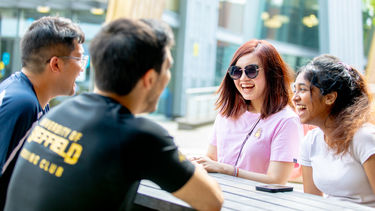My masters helped me to secure a PhD position at Sheffield

I did my undergraduate degree in Biomedical Sciences with a Year Abroad at the University of Sheffield. While studying abroad as part of my degree, I discovered an interest in infectious disease and immunology. This wasn’t a topic that was explored much in my BSc, so I began researching different Masters courses. I wanted something that would allow me to fully explore my interests and give me the lab experience I needed to go into PhD study.
This led me to the MSc Antimicrobial Resistance. The course looked perfect for me, combining all of my interests: molecular pathogenesis, microbiology, cell biology and immunology. There was also a significant research project as part of the course. Furthermore, the course included modules on science communication, research and career development, which I thought would be great for learning some transferable skills and help with job applications. Finally, the course meant I could stay in Sheffield. After living in Sheffield for three years, I’ve come to love the city and how close it is to the Peak District, so this was a big bonus for me.
I’ve really enjoyed the masters. Because it’s such a small cohort (only seven of us), the teaching is far more interactive than my previous degree. It means lectures are more like group discussions, which I found really useful. Being such a specialised course means you can go into a lot of detail and examine each topic from different perspectives – looking at molecular science, clinical approaches, public health and national and global policy. I thought this was very important to gain a holistic view of antimicrobial resistance.
Being such a specialised course means you can go into a lot of detail and examine each topic from different perspectives – looking at molecular science, clinical approaches, public health and national and global policy. I thought this was very important to gain a holistic view of antimicrobial resistance.
Thomas Burgess
MSc Antimicrobial Resistance
My favourite part of the course has been the laboratory project. The department put a lot of effort in to make sure we were still allowed in the lab despite the pandemic. Getting this hands on experience in a lab was really important to me and I enjoyed the independence I was given to design and execute my own experiments.
Throughout my masters, I applied to several PhD programmes. Everyone was really supportive of me and were happy to help with the application process and interviews. However, the most valuable thing for me was being able to have conversations with my tutor and several lecturers, who gave me candid advice to help me get the PhD I wanted. I had interviews from three different PhD programmes and was offered two different PhD positions. I decided to accept a DiMeN PhD position at the University of Sheffield, researching Hif modulated neutrophil responses to fungal infection in the Elks lab.

International Merit Scholarships
We offer a generous package of financial support for international students including 75 undergraduate scholarships worth £10,000 towards the annual tuition fee and 125 postgraduate taught scholarships worth £5,000 towards the tuition fee. Applications are now open for existing offer holders.

